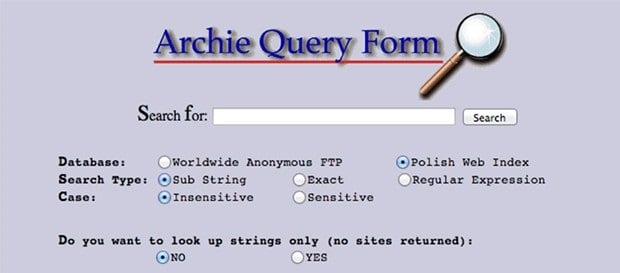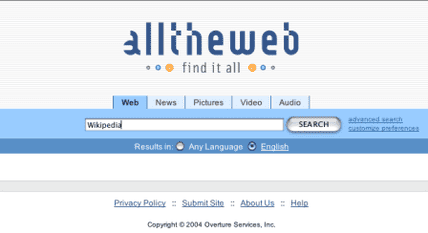
Have you ever thought of the old search engines or the Earliest search engines? Today we can’t do without search engines, they have become an indispensable part of our digital lives, connecting us to the vast expanse of information available on the internet. We now rely heavily on popular search engines like Google, Bing, and Yahoo. However, before these giants dominated the search landscape, there were earlier pioneers that paved the way for the search engine revolution there were the Early internet search tools.
In this article, I will take you on a nostalgic trip down memory lane and explore 15 of the oldest search engines that played a crucial role in shaping the way we navigate the web.
Suggested tool: Top 15 Free Keyword Research Tools
Suggested read: RoadMap to Becoming An SEO Expert
15 Old Search Engines – The Earliest Pioneers of Web Exploration
1. Archie:

Archie was Launched in 1990, it was the first search engine to index and search file names in FTP (File Transfer Protocol) sites. Although not a traditional search engine, Archie provided a way to locate and download files from FTP servers, making it an essential tool for early internet users.
2. Veronica:
Veronica was developed in 1992 and it was a companion search engine to Archie. It indexed the titles of files on Gopher servers, an earlier distributed information system. Users could search for files and retrieve relevant results based on file titles, enabling efficient access to the vast amount of data stored in Gopher servers.
3. Jughead:
It was created in 1993. It was another search engine designed specifically for Gopher servers. Unlike Archie and Veronica, Jughead focused on indexing directory titles rather than file names. By searching through Gopher menus, users could quickly locate the desired directories and access the content they contained.
4. WorldWideWeb:
Tim Berners-Lee was the inventor of the WorldWideWeb search engine wish was created in 1993. It was one of the earliest search engines that allowed users to search for information across web pages.
WorldWideWeb featured a simple interface where users could enter keywords and retrieve a list of web pages containing relevant content, laying the foundation for future web search engines.
Also check: Top Affiliate Programs you can join and Start Earning
5. WebCrawler:

WebCrawler was one of the first search engines to provide full-text search capabilities across web pages and it was launched in 1994. It quickly gained popularity due to its comprehensive indexing and efficient search algorithms. WebCrawler displayed search results in a clean and user-friendly interface, making it a favorite among early internet users.
6. Lycos:

Lycos quickly emerged as one of the most popular search engines of its time after its creation in 1994. It introduced features like relevance ranking and supported advanced search queries. Lycos also integrated web directory browsing, making it a one-stop destination for users to search for information and explore curated website listings.
7. AltaVista:

AltaVista was launched in 1995, and it revolutionized web search by introducing a new algorithm called PageRank. It was developed by computer scientists at Digital Equipment Corporation (DEC), PageRank revolutionized relevance ranking by analyzing the link structure of web pages. AltaVista’s fast and accurate search results quickly made it a favorite search engine for millions of users.
8. Infoseek:
Infoseek provided users with an extensive index of web pages, news articles, and multimedia content. it was also Founded in 1994 and It offered advanced search features like phrase searching and Boolean operators, empowering users to refine their queries and find precise information. Infoseek’s user-friendly interface and accurate search results made it a go-to search engine during the early Internet era.
Also read: 6 Password Safety Tips you Should Never Ignore
Also Read: 10 Signs of a Malware Infection on your Computer
9. Excite:
Excite is a web search that gained popularity for its comprehensive search capabilities and personalized features. It was launched in 1995, and It introduced concepts like personalization, email, and news aggregation, making it a trailblazer in delivering a customized web experience to users. Excite also featured a directory of websites, allowing users to browse through different categories and discover new online destinations.
10. Yahoo:

Yahoo was founded in 1994, and started as a web directory before evolving into a full-fledged search engine. It combined human-edited directory listings with automated search results, providing users with a comprehensive search experience. Yahoo! played a pivotal role in organizing the growing web by categorizing websites into different topics. Its iconic directory structure became a popular way to navigate the internet during its early years.
11. HotBot:
HotBot was launched in 1996 and differentiated itself by focusing on offering multilingual search capabilities. It supported various languages, making it a valuable resource for users worldwide. HotBot featured advanced search options, including domain-specific search, phrase searching, and Boolean operators. Its innovative approach to search technology and international appeal contributed to its popularity.
Also read: 9 Most Deadliest Computer Viruses that Stood the Test of Time
12. Northern Light:
Northern Light is a search engine that introduced a unique concept by indexing and categorizing millions of web pages. It was established in 1997 and it provided users with a structured approach to search by organizing information into specific industry categories. Northern Light also offered a powerful advanced search syntax that allowed users to narrow down their queries and access highly relevant results.
13. Ask Jeeves:

It was later known as Ask.com, introduced a conversational search approach in 1996 that allowed users to ask questions in plain English, and the search engine would attempt to understand the query and provide relevant answers. Ask Jeeves focused on natural language processing, aiming to bridge the gap between users and search technology.
Suggested read: Top 10 Tips on How to Identify Phishing Emails and Links
14. AllTheWeb:

AllTheWeb was launched in 1999 and it aimed to be one of the most comprehensive search engines of its time. It boasted a massive index, rivaling the size of leading search engines, and provided fast and accurate search results. AllTheWeb also pioneered features like image search, multimedia search, and language translation, making it a versatile search platform. But, Google soon overtook it.
15. Google:

From earliest to recent, Google has become the giant of search engines. it was founded in 1998 and it has revolutionized web search with its innovative PageRank algorithm, which focused on the relevance and popularity of web pages. Google quickly gained popularity for its simplicity, speed, and highly accurate search results. It introduced features like “I’m Feeling Lucky” and advanced search operators, empowering users to find information with precision. Google’s continuous innovation, user-centric approach, and commitment to providing the best search experience propelled it to become the dominant search engine globally.
Suggested read: Google Indexing and How Web Crawler Works
Also read: 20 Things you didn’t know you could do with Google Search Engine
What Are the 5 Famous Pioneers of web search?
The field of web search has seen several pioneers who have made significant contributions to the development and advancement of search engines. Here are five famous pioneers of web search:
1. Larry Page and Sergey Brin:
Larry Page and Sergey Brin co-founded Google in 1998, revolutionizing web search with their innovative PageRank algorithm. Their algorithm ranked web pages based on the number and quality of links pointing to them, providing more relevant search results and forming the basis for Google’s success.
2. Tim Berners-Lee:
Tim Berners-Lee is credited with inventing the World Wide Web in 1989. Although not directly involved in web search, his creation of the web laid the foundation for search engines to index and organize information on the internet.
3. Danny Sullivan:
Danny Sullivan, often referred to as the “godfather of SEO” (Search Engine Optimization), played a crucial role in shaping the understanding and practice of optimizing websites for search engines. He founded Search Engine Watch, a leading resource for search engine industry news and analysis, and later co-founded Search Engine Land.
Also read: What Search Engine did People Use before Google?
4. Jerry Yang and David Filo:
Jerry Yang and David Filo co-founded Yahoo! in 1994, which initially began as a directory of websites. While Yahoo! evolved into a major internet portal, its early directory served as an important precursor to modern search engines.
5. Vannevar Bush:
Vannevar Bush, an American engineer, and inventor, proposed a concept called the “memex” in a 1945 article titled “As We May Think.” The memex was an early vision of a machine that could store and retrieve vast amounts of information, anticipating the concept of hypertext and providing inspiration for future developments in web search.



